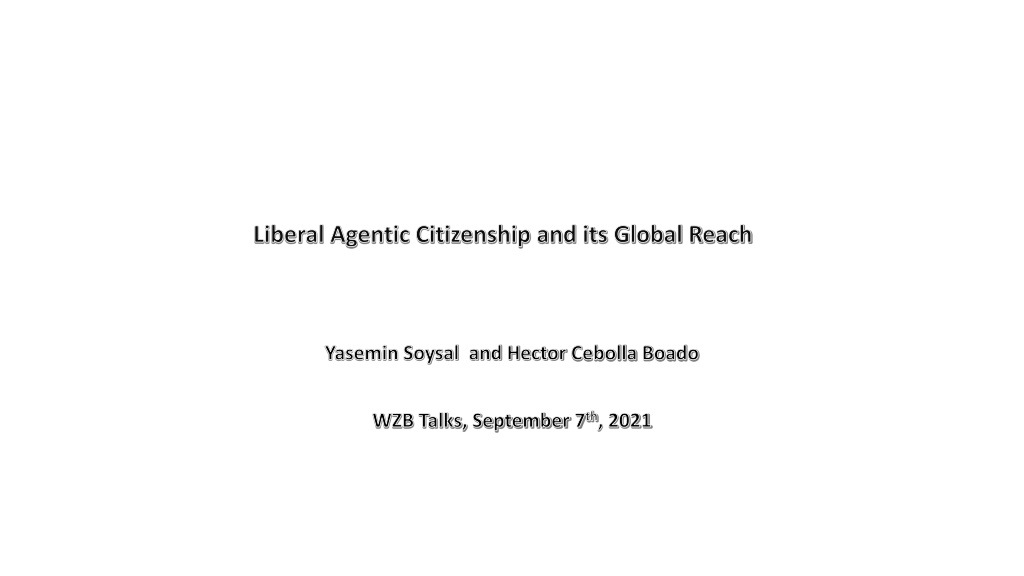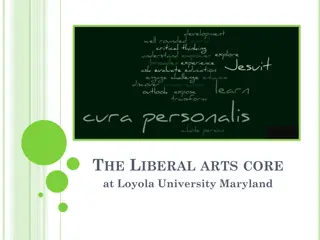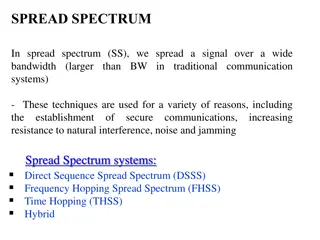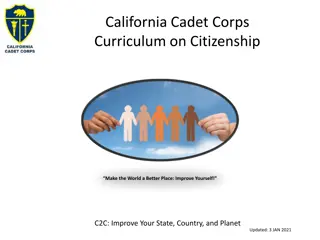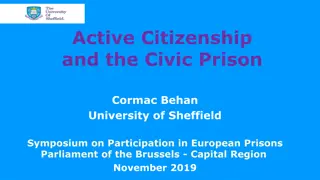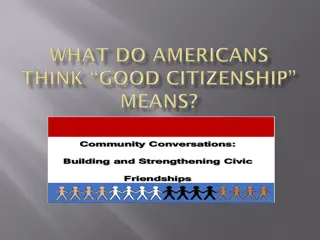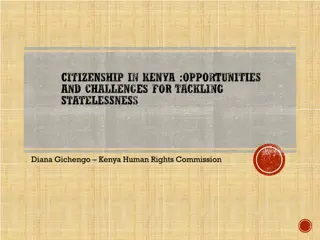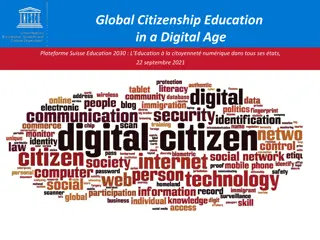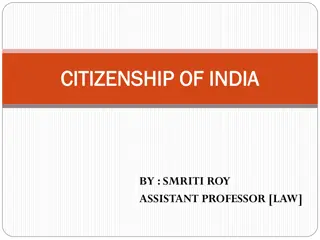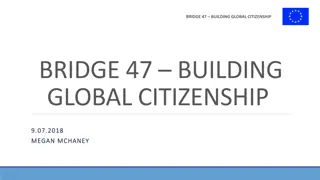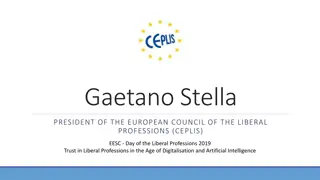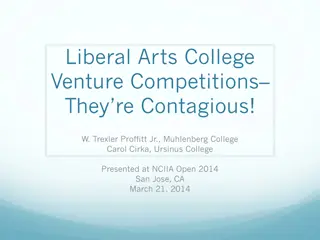The Global Spread of Liberal Agentic Citizenship
Exploring the diffusion and impact of liberal, agentic citizenship on individuals within a globalized knowledge society. The rise of agentic individuals empowered to participate at local, national, and transnational levels, alongside the challenges and inequalities associated with this model. Analyzing the presence of agentic citizenship elements in individual self-representations, parental influences, and the role of international mobility in shaping agentic identities.
Download Presentation

Please find below an Image/Link to download the presentation.
The content on the website is provided AS IS for your information and personal use only. It may not be sold, licensed, or shared on other websites without obtaining consent from the author. Download presentation by click this link. If you encounter any issues during the download, it is possible that the publisher has removed the file from their server.
E N D
Presentation Transcript
Liberal Agentic Citizenship and its Global Reach Yasemin Soysal and Hector Cebolla Boado WZB Talks, September 7th, 2021
Book project Book project Book s orientation: globalization and diffusion of liberal, agentic citizenship in the context of knowledge society and its enactment by individuals The rise of the agentic individual (Soysal 1994, 2012; Meyer and Jepperson 2002, Meyer 2010): empowered and adaptable in a globalized knowledge society and has the virtue and capability of participating at local, national and transnational spheres Higher education and international mobility/migrations as strategic research sites
Liberal, agentic citizenship Liberal, agentic citizenship Agentic characteristics achievement oriented and independent; belief in self-capabilities; belief in control over success and life course culturally charged and naturalized by ideologies of meritocracy talent and effort rather than ascriptive categories associated with American individualism; since the 1990s globally diffused promoted by international organizations (UNESCO, OECD, World Bank); adopted in government policies (social investment policies, point-based immigration schemes); practiced in educational spheres (curricula, teaching pedagogy) the failing promises of agentic, meritocratic citizenship (Fourcade 2021, Lamont 2020, Piketty 2017, Sandel 2017) manifest gap between the script and its actualization, and the resulting inequalities and contestations (SCRIPTS cluster) propels the professional and upper middle-classes to engage in concerted cultivation and intensified class work (Lareau 2003) entraps individuals in a race of performance and demonstration of worth, inviting moral desert and self-blame, and inevitably leading to stress, anxiety, and mental health challenges particularly among the youth (Lamont 2020, Fourcade 2021)
Analytical focus Analytical focus the scope and reach of the diffusion of agentic, meritocratic citizenship a) which elements and principles of agentic citizenship are (or not) present in individual repertoires of self? (convergence argument, Stanford school of globalization) b) to what extent do agentic, meritocratic self-projections reflect parental backgrounds? (distinction/ class strategy argument, Bourdieu inspired social stratification field) c) what is the role of international mobility in fostering agentic, meritocratic individuality? (transnational human capital and positive selectivity arguments) d) what is the role of institutional standardization and the codification of agentic, meritocratic model in various organizational contexts? (neo-institutional argument) e) what are the consequences of the differential realization of aspirational and agentic self- constructions for subjective well-being and broader life course and political orientations?
Empirical strategy Empirical strategy Higher Education as the institutional site and higher education students as our sample promotes a self-conscious liberal world society and its citizens (Schofer et al 2020, Frank and Meyer 2020); highly globalized (Ramirez and Christensen 2013, Soysal et al 2020) and increasingly massified education a core variable organizing political cleavages (Koopmans and Zurn 2019) Double-comparative design cross-national (UK, Germany, China, Japan): liberal/non-liberal political spectrum and individualist/ collectivist cultural spectrum internationally mobile vs non-mobile student groups family background, societal contexts such as province of origin, and university level characteristics
Our data: The Survey Our data: The Survey Country Sub-sample of students Freq. Two-stage probability sample in Europe Stratified universities into groups UK British Chinese int. Japanese int. 1,666 1,486 319 by ranking and number of Chinese students Germany German Chinese int. Japanese int. 423 809 56 In each university random sample of student groups Similar sampling in China (additionally stratified by provinces); quota sampling in Japan Japan Japanese Chinese int. 413 491 Questionnaires in Chinese/ Japanese/ English/ German, depending on group China Chinese 3,336 TOTAL 8,999 Soysal and Cebolla 2021, http://brightfutures-project.com/technical-report/
Aspirations for international education Aspirations for international education China Family Panel Study (2010) have you ever considered sending your child abroad? China Family Panel Study (2010) have you ever considered sending your child abroad?
Are parents with higher income and educational attainment more likely to consider IE for their Are parents with higher income and educational attainment more likely to consider IE for their child? child?
Does exposure to the transnational explain aspirations? Does exposure to the transnational explain aspirations? Index of transnational exposure (province level indicators): number of foreign visitors, number of broad band subscribers, number of web-domains, number of patents, the total value of investment by foreign enterprises, and the total value of imports and exports / by population, GDP. Source: China Bureau of Statistics.
To what extent are aspirations for IE realized? To what extent are aspirations for IE realized?
Liberal, agentic self Liberal, agentic self- -projections: dimensions projections: dimensions agentic individuality creative, makes his or her own decisions, looks for adventures and risks, and success oriented (five points scale: not at all like me, somewhat unlike than me, neither like nor unlike me, somewhat like me, very much like me) self-efficacy (one s belief in their capabilities) finds a way to get what they want, sticks to their aims, deals efficiently with the unexpected, thinks of a solution to problems (five points scale: not at all like me, somewhat unlike than me, neither like nor unlike me, somewhat like me, very much like me) Meritocracy (one s belief about what matters for success) hard work, talent, self-confidence (internal locus of control) (five points scale: not at all important, slightly important, moderately important, very important, extremely important) Analytical samples Chinese students enrolled in Chinese universities and abroad (UK, Germany, and Japan) UK students enrolled in British universities German students enrolled in German universities Japanese students enrolled in Japanese universities
Distribution of synthetic indexes: agentic individuality, self Distribution of synthetic indexes: agentic individuality, self- -efficacy, meritocratic orientation efficacy, meritocratic orientation Source: BF 2018
OLS estimates OLS estimates Source: Estimates obtained from models 1, 3, and 7 in Table 2.
Further reflections Further reflections Overall, the book project aims to provide a correction to the conceptualizations of globalization that privilege international mobilities as a main driver. It also aims to reassess and partly challenge the argument that the current cleavages are neatly lined between the globally oriented liberals and the nationally bound communitarians. findings support the neo-institutionalist argument that emphasizes the global standardization of the model of agentic and meritocratic citizenship a strong empirical regularity of student self-constructions, not only across higher education systems but also across differently ranked and resourced universities, which suggests that it is an effect of university as an institution independent of its national context rather than an effect of university as an organization and its resources. family background or international mobility itself does not explain aspirational, agentic and meritocratic orientations among higher education students Chinese students abroad come predominantly from wealthier and more educated families (although more heterogenous backgrounds than commonly assumed), yet students from less advantaged family backgrounds, who are not internationally mobile, whose aspirations may not be realized, are not less agentic, capable or meritocratic oriented.
Further analyses Further analyses To what extent are agentic and meritocratic self constructions linked with broader liberal life course and political orientations? What are the consequences of differential realization of aspirations and agentic selves for subjective well-being? Preliminary finding: no major differences in a standardized scale of mental distress (Kessler) among student groups in different countries; no difference between the internationally mobile and not mobile students either. The general stress level among higher education students might not be due to unrealized ambitions and thus correlate feelings of failure as widely suggested in the literature that primarily focus on western societies.
